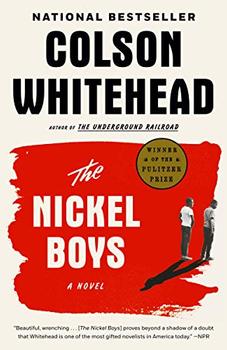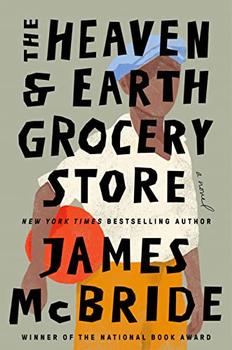Summary | Excerpt | Reading Guide | Discuss | Reviews | Beyond the book | Read-Alikes | Genres & Themes | Author Bio

In this bravura follow-up to the Pulitzer Prize, and National Book Award-winning #1 New York Times bestseller The Underground Railroad, Colson Whitehead brilliantly dramatizes another strand of American history through the story of two boys sentenced to a hellish reform school in Jim Crow-era Florida.
As the Civil Rights movement begins to reach the black enclave of Frenchtown in segregated Tallahassee, Elwood Curtis takes the words of Dr. Martin Luther King to heart: He is "as good as anyone." Abandoned by his parents, but kept on the straight and narrow by his grandmother, Elwood is about to enroll in the local black college. But for a black boy in the Jim Crow South of the early 1960s, one innocent mistake is enough to destroy the future. Elwood is sentenced to a juvenile reformatory called the Nickel Academy, whose mission statement says it provides "physical, intellectual and moral training" so the delinquent boys in their charge can become "honorable and honest men."
In reality, the Nickel Academy is a grotesque chamber of horrors where the sadistic staff beats and sexually abuses the students, corrupt officials and locals steal food and supplies, and any boy who resists is likely to disappear "out back." Stunned to find himself in such a vicious environment, Elwood tries to hold onto Dr. King's ringing assertion "Throw us in jail and we will still love you." His friend Turner thinks Elwood is worse than naive, that the world is crooked, and that the only way to survive is to scheme and avoid trouble.
The tension between Elwood's ideals and Turner's skepticism leads to a decision whose repercussions will echo down the decades. Formed in the crucible of the evils Jim Crow wrought, the boys' fates will be determined by what they endured at the Nickel Academy.
Based on the real story of a reform school in Florida that operated for one hundred and eleven years and warped the lives of thousands of children, The Nickel Boys is a devastating, driven narrative that showcases a great American novelist writing at the height of his powers.
The debate about the merits of respectability politics and integrating into white society versus an ideology of Black liberation is as timely as ever, in an era when unabashed white supremacy is on the rise across the globe, and Whitehead's critique of assimilationist politics is sharp. Thoughtful and engaging, The Nickel Boys offers astute observations about the history of race relations in America: it's sure to appeal to the author's devoted readers as well as those new to his work...continued
Full Review
(761 words)
This review is available to non-members for a limited time. For full access,
become a member today.
(Reviewed by Michael Kaler).
 Colson Whitehead's The Nickel Boys sketches a horrific portrait of a brutal reformatory school, the Nickel Academy, where staff members routinely torture and terrorize the institution's teenage students. The events of the story are unsettling, and even more so given that Nickel is a fictionalized version of Florida's first juvenile detention center: the Arthur G. Dozier School for Boys.
Colson Whitehead's The Nickel Boys sketches a horrific portrait of a brutal reformatory school, the Nickel Academy, where staff members routinely torture and terrorize the institution's teenage students. The events of the story are unsettling, and even more so given that Nickel is a fictionalized version of Florida's first juvenile detention center: the Arthur G. Dozier School for Boys.
Opened in 1900 in the panhandle town of Marianna, the detention center was first run by governor-appointed commissioners, and later directly by the governor and cabinet of Florida. According to Smithsonian Magazine, Florida state statutes mandated that the center be "not simply a place of correction, but a reform school, where the young offender of the ...
This "beyond the book" feature is available to non-members for a limited time. Join today for full access.

If you liked The Nickel Boys, try these:

The Heaven & Earth Grocery Store
by James McBride
Published 2025
From James McBride, author of the bestselling Oprah's Book Club pick Deacon King Kong and the National Book Award–winning The Good Lord Bird, a novel about small-town secrets and the people who keep them.

by Tananarive Due
Published 2024
A gripping, page-turning novel set in Jim Crow Florida that follows Robert Stephens Jr. as he's sent to a segregated reform school that is a chamber of terrors where he sees the horrors of racism and injustice, for the living, and the dead.
Discovery consists of seeing what everybody has seen and thinking what nobody has thought.
Click Here to find out who said this, as well as discovering other famous literary quotes!